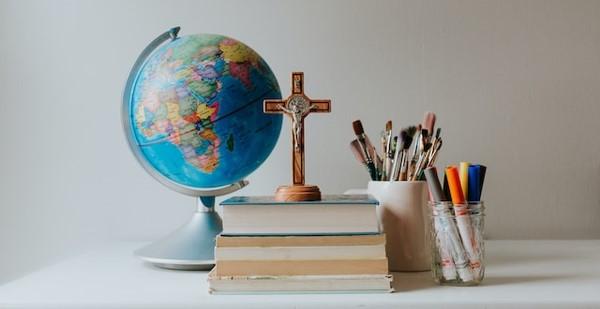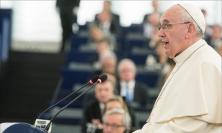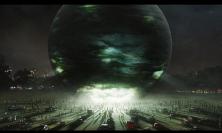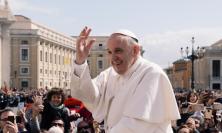Just before World Youth Day 2023, Cardinal Michael Czerny SJ spoke to young people in Lisbon at the ‘International Conference on the Care of Creation’ about their commitment to integral ecology. Discussions about cultivating lifestyles that embody a new humanity have a strikingly prophetic tone at this crucial point of history, he says, and they can be much informed by the words of Pope Francis.
The Anthropocene is a new geological epoch; it names a staggering turning point in the history of our planet. Never before has homo sapiens lived in such a time. Humans now have significantly altered, and are significantly altering, all of earth’s systems – the atmosphere, the oceans, the continents and ecosystems – the whole community of life on earth. We are now experiencing disturbing concurrent trends – ice rapidly disappearing (Arctic Sea ice, mountain glaciers, and parts of the Greenland and Antarctic ice sheets), hotter and more acidic oceans, rising sea levels, extreme weather (droughts, floods, unprecedented temperatures) and catastrophic wildfires. This is affecting marine, freshwater and terrestrial life more and more. Since late winter, my home country of Canada has experienced its worst wildfire season, and in late June and early July, the resultant smog blanketed large cities across North America and even reached Portugal. In mid-2023, three continents found themselves in the grip of extreme heat.
The world of the 2020s has already left the safe Holocene climate zone, the global climate conditions in which agriculture and civilisations have developed over the past 11,700 years, since the last Ice Age. Heat records are now being exceeded yearly, even month by month.
Human activity causing greenhouse gas emissions is the cause of the excessive heat. More than ninety nations have now signed the Paris Accords and set voluntary targets to reach net-zero emissions by mid-century. But not enough is being done to put these commitments into effect, and results are falling short of the target. So things will get worse. We are now heading dangerously close to the 1.5-2 °C ceiling targeted by the Accords; and the dangerous tipping points looming within the next several decades are getting closer and closer.
In Laudato si’, Pope Francis reframes church teaching on creation – on the natural environment that is our unique cradle of organic life – by highlighting the neglected fact that humans are an integral part of the earth system and are now collectively shaping its future. He urgently invites the world to engage in honest dialogue: ‘How shall we construct the future of the planet?’ He provides us with the elements needed to reflect theologically on integral ecology. Integral ecology interconnects the wide range of languages and categories that take us ‘to the heart of what it is to be human’ (Laudato si’ [henceforth LS] §11). So, we need to discover in a new way just who is ‘Anthropos’, both as an integral part of the dynamic ecologies of the Earth system, and as having an outsized role and responsibility in the Anthropocene. In Laudato si’, the Holy Father helps us to think about all this humanly, spiritually and theologically.
The gospel calls us to change how we live, act and pray in the face of the unprecedented and complex combination of multiple crises:
- the eco-crisis;
- the plague of extreme positions, the so-called ‘culture wars’;
- the hundreds of millions in misery, more and more of them forced to flee their homes; and
- the new digital age with much promise and many pitfalls.
New meanings and fresh values are needed and, above all, living examples of persons, communities and institutions that embody a new humanity.
Humanity has to change (LS §202); indeed, more deeply, we have to convert. The required change involves much more than simply political or technological solutions. The climate, along with the atmosphere, earth and waters of our planet, constitute a common good, belonging to all and meant for all. We must become more aware of our common origin, our mutual belonging, and our shared future. From this awareness should spring new convictions, new connections and attachments, new styles of life (LS §202).
The third chapter of Laudato si’ traces the ‘human roots’ of the ecological crisis back to a particular way of perceiving and relating to the natural world that has spread since the Industrial Revolution and become modernity’s reigning mindset or worldview. Its technocratic paradigm, its model of runaway development, tends to dominate economic, political and cultural life, and pits humans against the natural world and against one another. It promotes a modern myth of progress ‘grounded in a utilitarian mindset (individualism, unlimited progress, competition, consumerism, the unregulated market)’ (LS §210).
Scientific activity in various fields shows that:
the network is the most effective model for describing reality. This prompts us to pay increasing attention to the interconnections between the different elements that make up the world, on which depends the delicate balance that makes our survival and that of all living species possible. This model is inspired by Laudato si', which both locates the human being within the interconnected web of reality and affirms the irreplaceable human role in the care of the common home.[1]
Moreover, if we are truly concerned with developing an ecology capable of remedying the damage we have done, no branch of the sciences and no form of wisdom can be left out (LS §63), including the religions, and cultural and spiritual riches of the many different peoples (LS §34). In this spirit, we thank the world’s indigenous peoples for their courageous efforts to protect the earth (LS §146).
‘Young people have a new ecological sensitivity and a generous spirit, and some of them are making admirable efforts to protect the environment.’ (LS §209) Not surprisingly, they ‘demand change. They wonder how anyone can claim to be building a better future without thinking of the environmental crisis and the sufferings of the excluded.’ (LS §13)
In short, the ‘immensity and urgency of the challenge we face’ impel us to embark on a new ‘ethical and spiritual itinerary’, in which ‘the results of the best scientific research available today’ play an absolutely essential role (LS §15) and in which we recalibrate the relationship between human beings and the environment.
Concrete actions
To achieve net-zero emissions, which will allow our overheated planet to cool off, transformations are necessary across all global systems – how our economies are powered, how people and goods are transported, how a growing and ageing population gets fed.[2] Important actions and major shifts are necessary for the green transition to sustainability. For example:
- To achieve net-zero emissions by mid-century means seriously and rapidly transitioning from a fossil-fuel economy to a clean-energy economy, everywhere on the globe.
- We must stop deforestation, especially in watersheds of global importance like the Amazon and the Congo; plant trees to further the greening of the earth and sequestering of carbon; and protect ocean shorelines from erosion by planting mangroves.
- To protect biodiversity and habitats, and halt ecosystem degradation, many countries are calling for the protection of 30% of land and marine environments by 2030.[3] The 30/30 target is considered to be a minimum.
- Cities, now home to over 57% of the world’s population, take up 3% of the land, but are responsible for most of the world’s energy consumption and greenhouse gas emissions. People-friendly cities require more public transport, more walking and ‘natural’ biking.
- Transportation: A rapid shift to far fewer private cars is urgently needed, and to greener fuels for all modes of transportation.
- Agriculture needs to regenerate itself in order to produce nourishing food in a way that restores soil health, sequesters carbon, and protects the climate, water resources and biodiversity.
- Economics and finance: the frantic pursuit of profit that ignores the common good in nature and society needs to give way to responsible economics and finance. ‘The external deserts in the world are growing, because the internal deserts have become so vast’ (LS §217, quoting Benedict XVI).
- ‘Our efforts at education will be inadequate and ineffectual unless we strive to promote a new way of thinking about human beings, life, society and our relationship with nature’ (LS §215). Both the teachers and the learners engaged in environmental education must be able to help themselves and everyone ‘to grow in solidarity, responsibility and compassionate care’ (LS §210) within the great network of life.
Integral ecology for everyone
‘Human life is grounded in three fundamental and closely intertwined relationships: with God, with our neighbour and with the earth itself’ (LS §66). ‘Everything is related, and we human beings are united as [siblings] on a wonderful pilgrimage, unfolding in the love God has for each of his creatures’ (LS §92). Integral ecology seeks ‘to restore the various levels of ecological equilibrium, establishing harmony within ourselves, with others, with nature and other living creatures, and with God’ (LS §210). Each of us, whatever our interests and skills, our location and opportunities, has a part to play.
Whether religious or not, everyone can agree that the earth is a shared inheritance, whose fruits are meant to benefit everyone both today and tomorrow. For believers, this becomes a question of fidelity to the Creator, since God created the world for everyone. Consequently, ‘it is not in accord with God’s plan that this gift be used in such a way that its benefits favour only a few. This calls into serious question the unjust habits of a part of humanity’ (LS §93). ‘Hence every ecological approach needs to incorporate a social perspective which takes into account the fundamental rights of the poor and the underprivileged’ (LS §93).
Like other traditions, our ‘rich heritage of Christian spirituality, the fruit of twenty centuries of personal and communal experience, has a precious contribution to make to the renewal of humanity’ (LS §216). More than just ideas, ‘the teachings of the Gospel have direct consequences for our way of thinking, feeling and living’, and ‘can motivate us to a more passionate concern for the protection of our world’ (LS §216).
Integral ecology takes work; indeed, it upholds the value of labour (LS §124). But this doesn’t mean becoming frantically hyper-active. We also need to contemplate the Creator who lives among us and surrounds us; to examine our commitments and lifestyle honestly; and to develop a serene harmony with creation (LS §225). ‘We are speaking of an attitude of the heart, one which approaches life with serene attentiveness, which is capable of being fully present... and accepts each moment as a gift from God to be lived to the full. Jesus taught us this attitude when he invited us to contemplate the lilies of the field and the birds of the air’ (LS §226). We should imitate Saint Therese of Lisieux whose ‘simple daily gestures ... break with the logic of violence, exploitation and selfishness’ (LS §230).
Conclusion
I invite you to take my words as just a step on your path towards caring for our common home. Please read chapter four of Laudato si’, entitled ‘Integral Ecology’, in which Pope Francis treats environmental, economic and social ecology; cultural ecology; ecology of daily life; the principle of the common good; and justice between the generations.
And we can look forward to more guidance from the Holy Father: on 21 August 2023, Pope Francis said that he was writing a second part of Laudato si’, to bring it up to date with ‘present problems’. We might ask: ‘What issues have emerged as significantly more dangerous and urgent today than their treatment in the 2015 encyclical suggests? What is our role in each one? What can and must we do about each one?’
No matter how Laudato si’ is updated, our obligation to the future is incontestable: ‘We must never forget that the younger generations have the right to receive a beautiful and livable world from us, and that this implies that we have a grave responsibility towards creation which we have received from the generous hands of God.’[4]
Looking back over the eight years, then, since we first read Laudato si’, we can also ask: ‘What impact did the encyclical have? What changes or developments should we be grateful for? What areas did it not reach? How can we help Laudato si’ and its update to reach more widely and more deeply?’
Pope Francis endorses Francis of Assisi as our best guide as we consider all of these questions:
Saint Francis is the example par excellence of care for the vulnerable and of an integral ecology lived out joyfully and authentically. He is the patron saint of all who study and work in the area of ecology, and he is also much loved by non-Christians. He was particularly concerned for God’s creation and for the poor and outcast. He loved, and was deeply loved for his joy, his generous self-giving, his openheartedness. He was a mystic and a pilgrim who lived in simplicity and in wonderful harmony with God, with others, with nature and with himself. He shows us just how inseparable the bond is between concern for nature, justice for the poor, commitment to society, and interior peace. (LS §10)
Cardinal Michael Czerny SJ is Prefect of the Vatican’s Dicastery for Promoting Integral Human Development: www.humandevelopment.va
This article is adapted from an address given to the 4th International Conference on the Care of Creation, on the theme of ‘Youth commitment to integral ecology: Lifestyles for a new humanity’. The conference was co-organised by the Fondazione Giovanni Paolo II per la Gioventù (in the Dicastery for Laity, Family and Life) and the Dicastery for Promoting Integral Human Development, and held at the Lisbon campus of the Università Cattolica del Portogallo on 31 July 2023.
The text, based on a speech delivered on 9 March 2023 at Gonzaga University in Spokane, U.S.A., was updated and redrafted by Robert Czerny and Tom McAuley in Ottawa.
[1] Furio Gramatica, ‘La rete come struttura dell’universo: La scienza dietro Laudato si’’ (‘The network as the structure of the universe: The science behind Laudato si'’), Aggiornamenti Sociali (May 2023), 348. Our translation.
[2] See World Resources Institute, https://www.wri.org/research/realizing-net-zero-emissions-good-practices-countries and https://www.wri.org/insights/net-zero-ghg-emissions-questions-answered.
[3] The United Nations has designated the next ten years as the ‘Decade on Ecosystem Restoration’. Only 16.44% of land worldwide is currently protected, along with 7.74% of the oceans.
[4] See Vatican News, ‘Pope Francis writing a second part of Laudato si'‘, 21 August 2023: https://www.vaticannews.va/en/pope/news/2023-08/pope-writing-second-part-of-laudato-si.html






